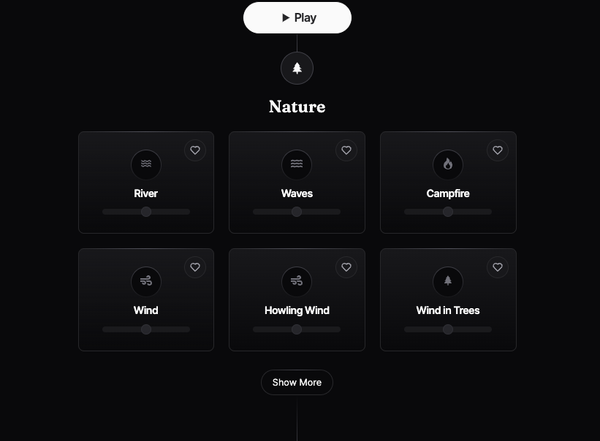Discover the Best 25 Open-source Free Personal Knowledge Management Apps for Windows, Linux, and macOS
Organize Your Thoughts and Ideas with These 25 Open-source Free Personal Knowledge Management Apps
Are You Truly Ready to Put Your Mobile or Web App to the Test?
Don`t just assume your app works—ensure it`s flawless, secure, and user-friendly with expert testing. 🚀
Why Third-Party Testing is Essential for Your Application and Website?We are ready to test, evaluate and report your app, ERP system, or customer/ patients workflow
With a detailed report about all findings
Contact us nowTable of Content
A personal management application serves as a centralized platform for gathering, structuring, and effortlessly accessing various forms of important data, including resources, bookmarks, notes, and other vital information. This tool is indispensable across a wide range of users, embodying a critical asset for individuals in numerous professions and fields of study.
Its versatility makes it a fundamental resource for students, educators, researchers, and medical professionals alike, streamlining the way they manage information.
Moreover, the utility of a personal management app extends beyond the academic and medical fields, proving to be equally valuable for professionals in the technological sector, such as software engineers and data scientists. By enabling these users to efficiently organize their work and research, the app facilitates a more productive and organized approach to their projects and tasks.
Its ability to centralize and simplify access to necessary information helps in minimizing time spent on searching for resources, thereby enhancing overall efficiency.
1- nb
nb is a multifaceted note-taking and knowledge management application that combines the simplicity of command-line and web interfaces. It stands out by offering a suite of features designed for efficient data handling and personal knowledge base construction.
Users can enjoy the reliability of plain text for data storage, enhanced with capabilities such as encryption for security, and a variety of organizational tools including filtering, tagging, and a powerful search function. Versioning and syncing options ensure that users can maintain historical records of their notes and access them across devices seamlessly.
Key Features
nb is a command line and local web note‑taking, bookmarking, archiving, and knowledge base application with:
- plain text data storage,
- encryption,
- filtering, pinning, #tagging, and search,
- Git-backed versioning and syncing,
- Pandoc-backed conversion,
- [[wiki-style linking]],
- terminal and GUI web browsing,
- inline images,
- todos with tasks,
- global and local notebooks,
- organization with folders,
- customizable color themes,
- extensibility through plugins,
and more, in a single portable script.
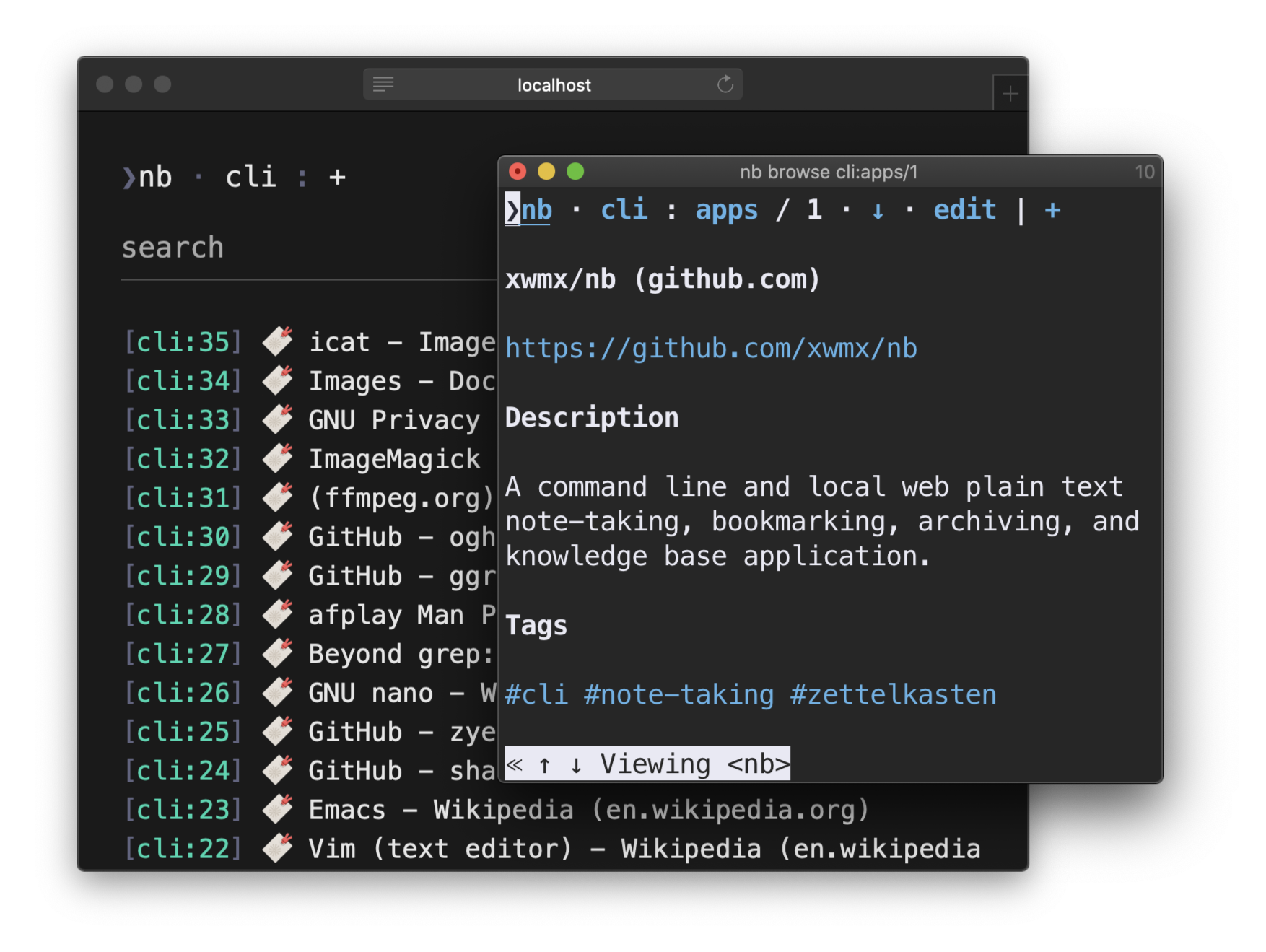
2- OsmoNote
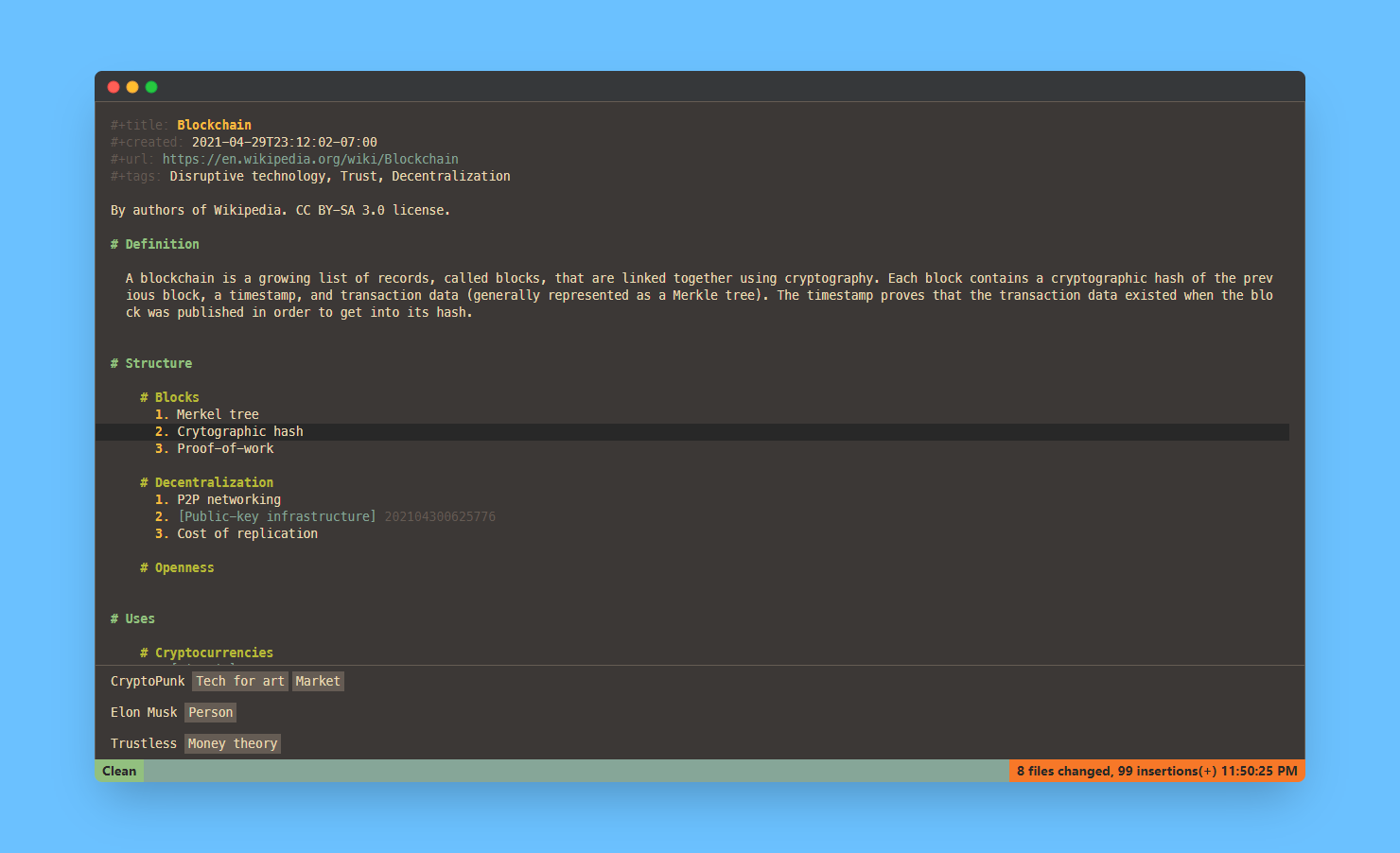
Osmos::note is a web-based text editor tailored specifically for networked note-taking, offering users the unique ability to self-host their notes on any Git repository. This innovative tool facilitates seamless note management and collaboration, allowing for easy access and version control of notes across different devices.
By leveraging Git repositories for storage, it ensures that users can maintain a secure and private space for their data, while also benefiting from the robust versioning and collaboration features Git provides. Osmos::note is an ideal solution for individuals and teams looking for a flexible and efficient way to organize their thoughts and work collaboratively on documents within a familiar and reliable ecosystem.
3- Lumen
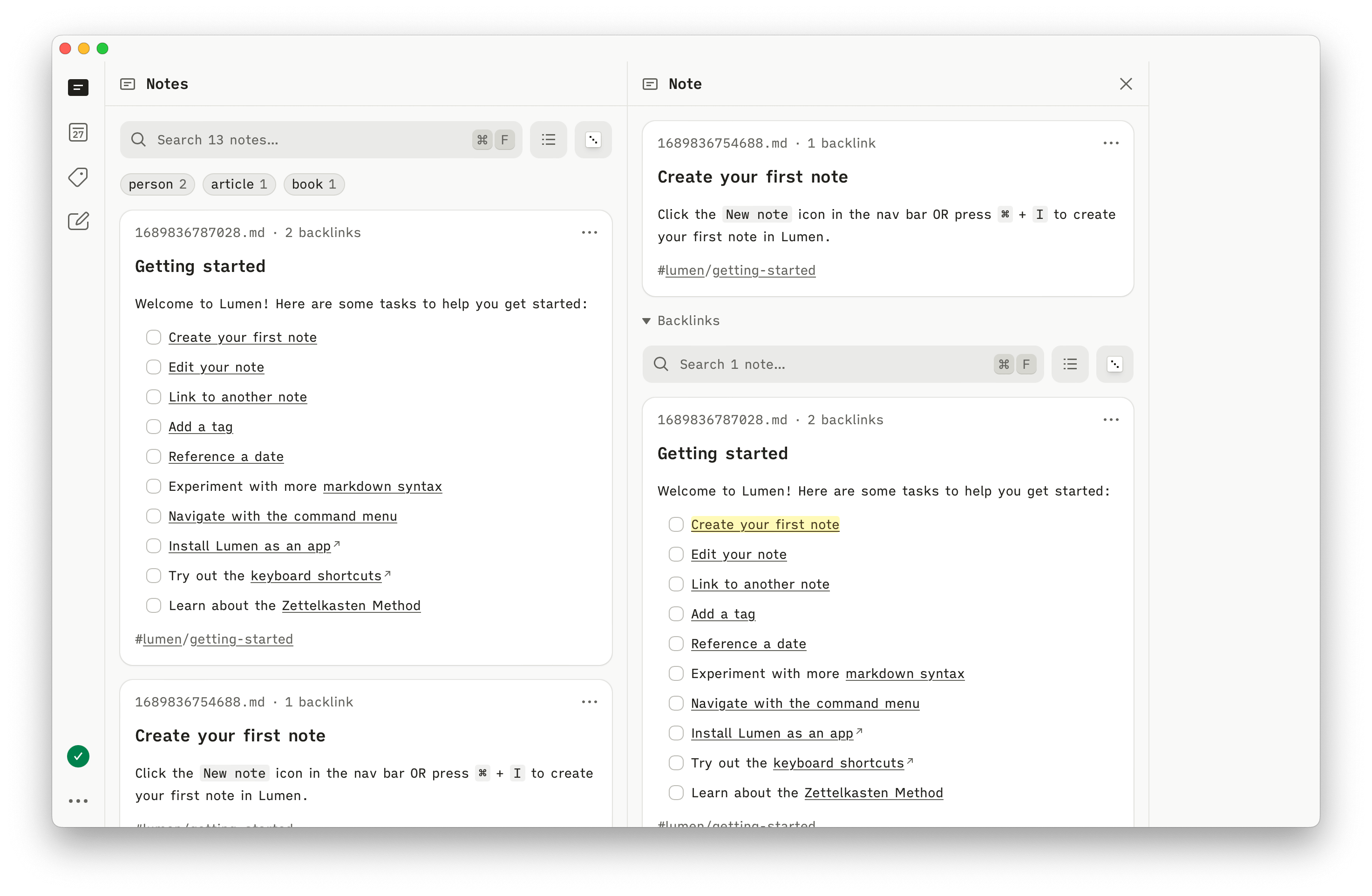
Lumen is a simple note-taking app for better thinking. It supports markdown format, allows users to organize their notes in tags, comes with a built-in todo and task manager, and full-text search.
Lumen stores the data directly in your Github repo, and it works completely offline.
4- SilverBullet
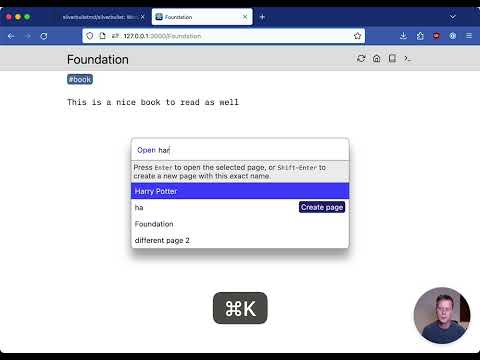
SilverBullet is designed as a versatile workspace for the mind, offering a dynamic environment for collecting, creating, and expanding personal knowledge. It distinguishes itself by not only serving as a straightforward note-taking app that saves notes in markdown format but also by unlocking advanced features for more technically adept users.
Through the use of metadata annotations, an Objects infrastructure, and the functionalities of Live Queries and Live Templates, SilverBullet transforms into a potent tool for end-user programming.
This allows users to swiftly create custom knowledge applications tailored to their needs. As an open-source, self-hosted, and offline-capable web application, SilverBullet provides a robust platform for anyone looking to enhance their knowledge management and productivity tools.
Key features
- Self-hosted
- Works completely offline
- Supports wiki-style page linking
- Keyboard based operation
- Command panel
- Full-text Search
5- Lurnby
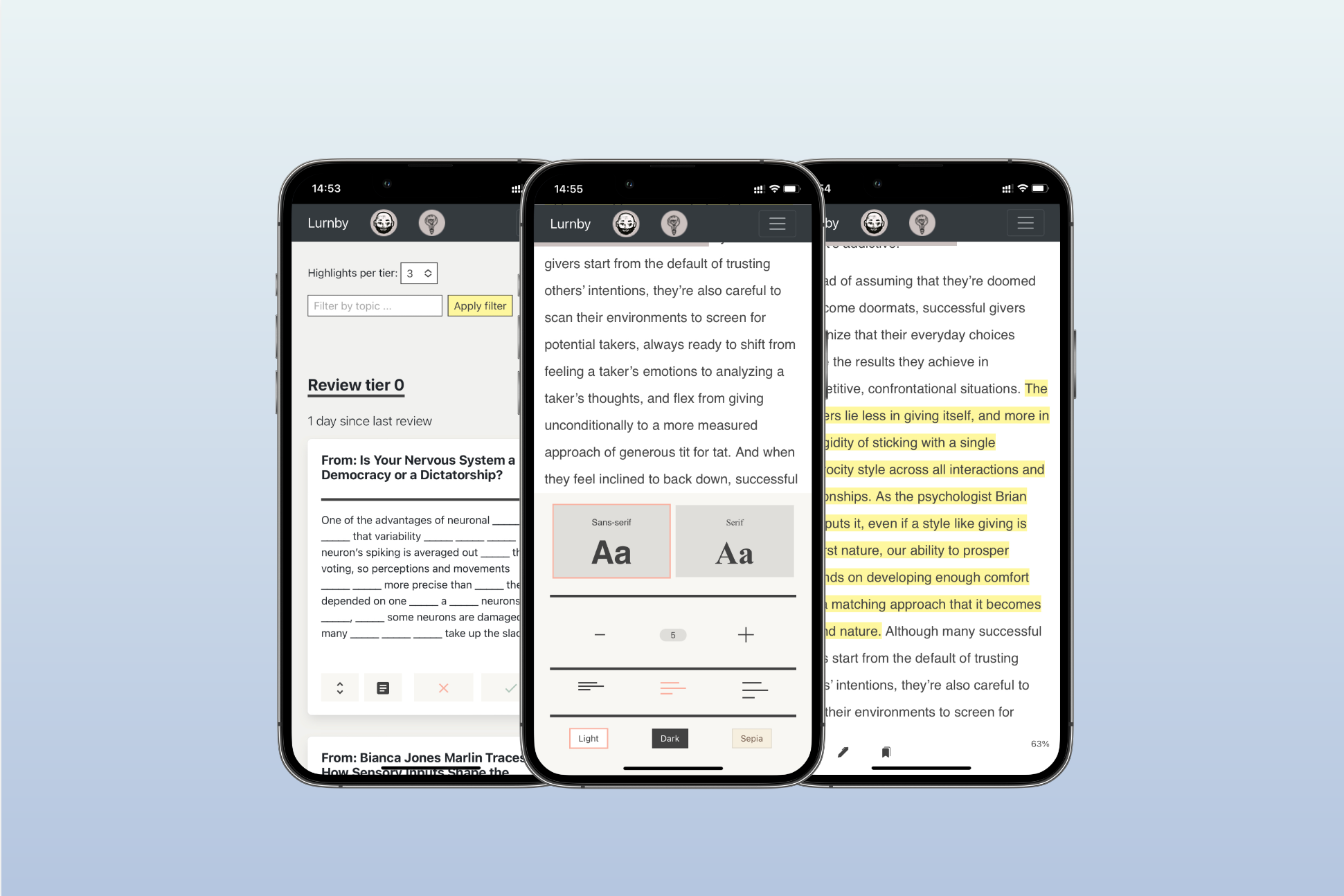
Lurnby is a tool for building a personal knowledge practice. Lurnby helps you read and remember more. It works with web articles and epubs, allowing you to highlight, categorize, and review your content with active recall and spaced reptition tools.
It comes with a responsive clutter-free and distraction-free interface, full-text search, multi-view display and mre.
It is written as a web-based self-hosted app, that you can install easily on your server or local machine using Docker.
Lurnby is built using Python, Flask, PostgreSQL, Redis and JavaScript.
6- NENO
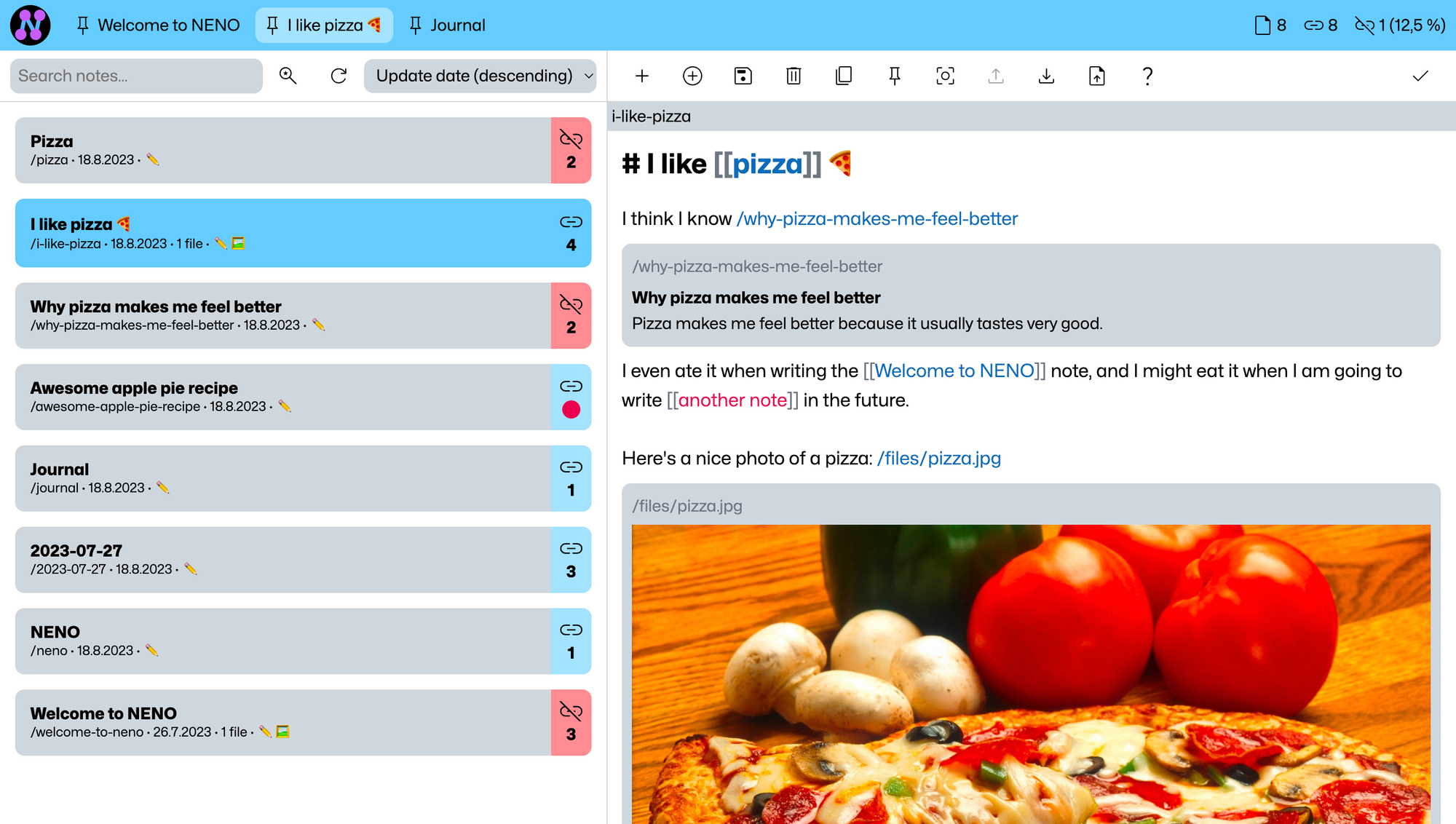
NENO is a powerful note-taking app that helps you manage your personal knowledge garden. With NENO, your data belongs to you and you decide where it is stored: On your device or on a cloud storage of your choice.
Features
- Full data ownership: You decide where your data is stored: On your device or on a cloud storage of your choice.
- Multiple media types: Paste video, audio, PDF documents, images and code, or any arbitrary file into your note
- Graph View: Drag and drop nodes and create your custom knowledge graph visualization
- Simple modeless markup with Subtext
- Interoperability: NENO's data format is backed by human-readable plain-text files for high interoperability
- Powerful full-text search
- Tap-to-link: One click is enough to link one note to another
- File overview: All files in one view
- Dark mode: Eye-friendly note-taking at night time
7- Dnote
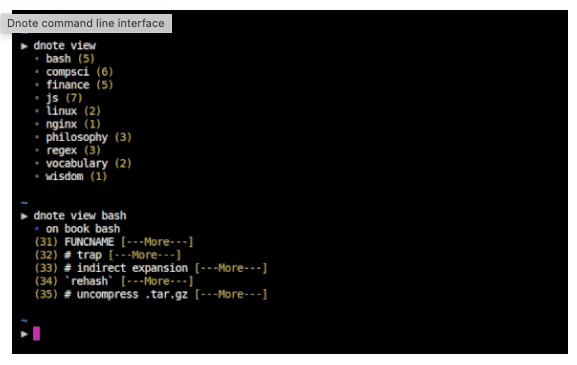
Dnote is a simple command line notebook for programmers.
It keeps you focused by providing a way of effortlessly capturing and retrieving information without leaving your terminal. It also offers a seamless multi-device sync.
8- monotome
The monotome is a personal knowledge base system that works as a browser extension. It supports markdown markup format and allow backlinks and Wiki syntax.
It is an ideal solution to organize your notes, thoughts and connect them directly from your browser.
monotome's code is released under the AGPL license.
9- Ter
Ter is an open-source tiny wiki-style site generator with Zettelkasten flavor.
10- Foam
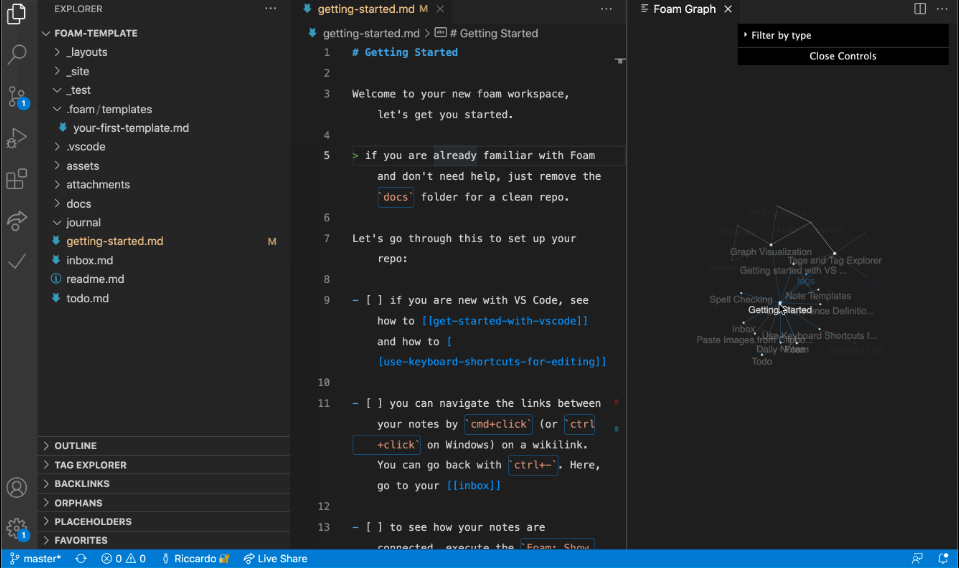
Foam is a personal knowledge management and sharing system inspired by Roam Research, built on Visual Studio Code. It's designed to enhance note-taking, research organization, and long-form content writing, with features that allow for web publishing.

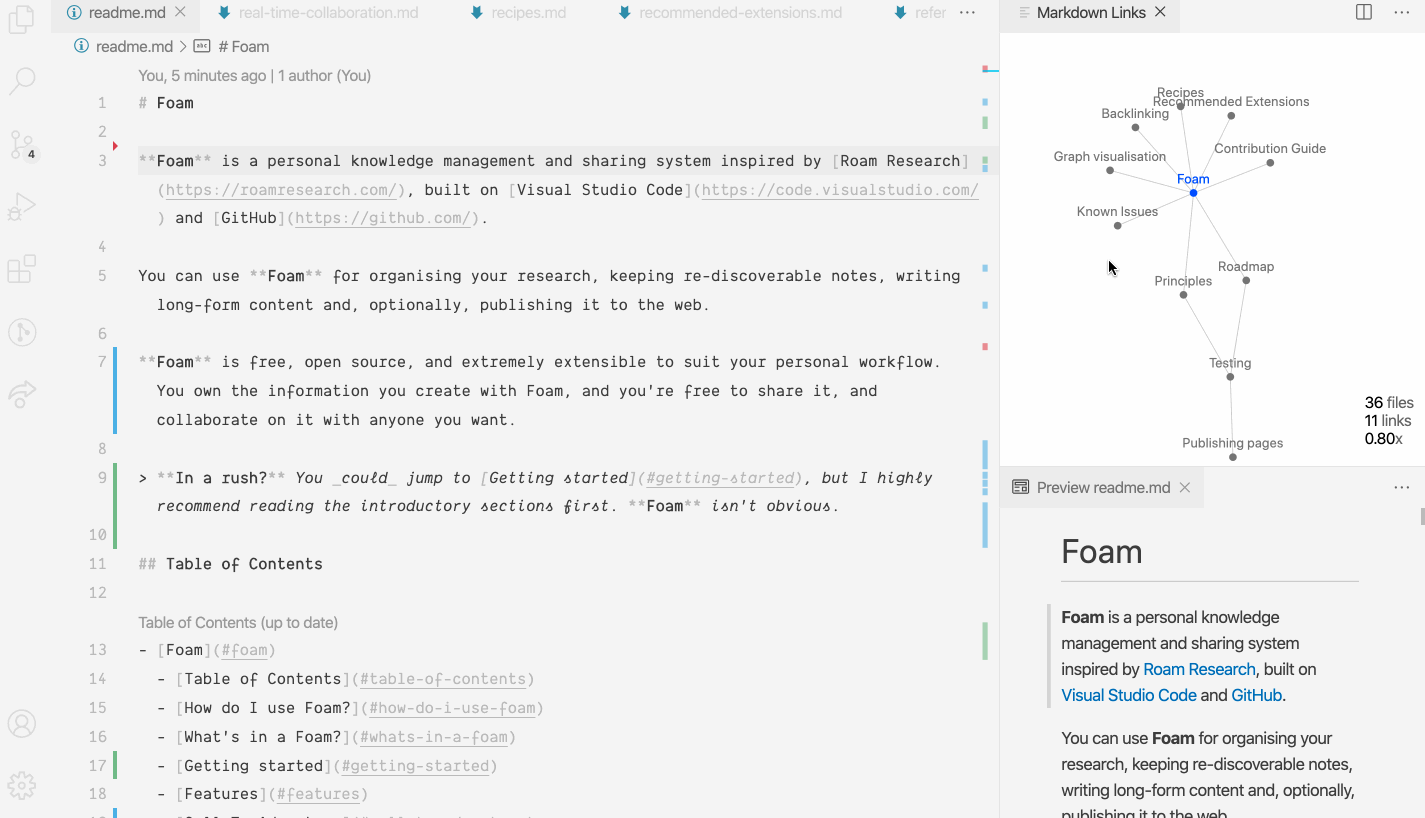
11- Obsidian
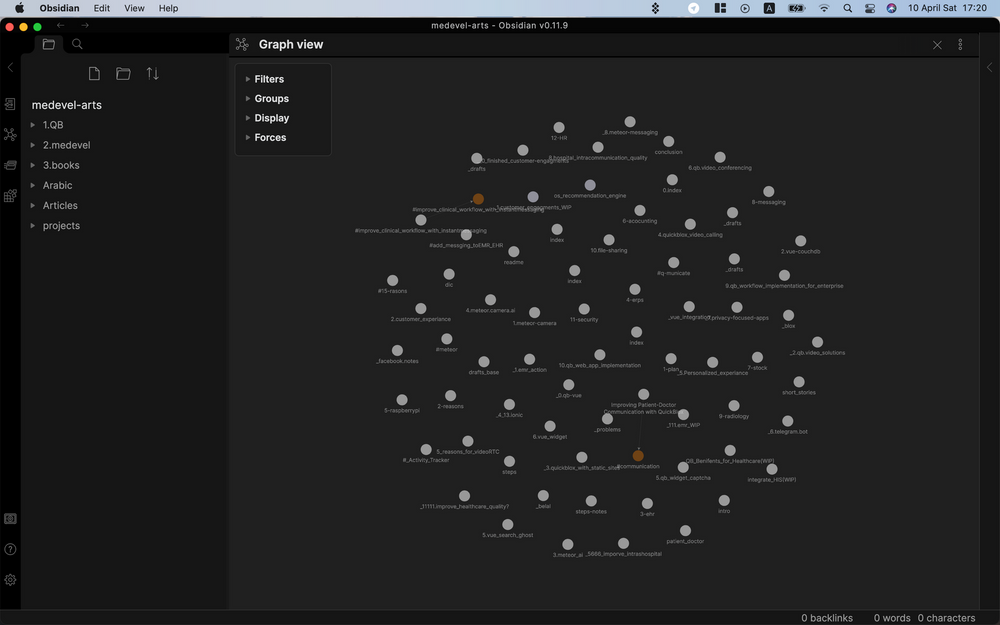
Obsidian is a private, flexible writing app designed to adapt to your thought processes. It allows for the storage of notes on your device for quick, offline access, ensuring privacy. The app supports extensive customization through plugins and themes, making it suitable for personal knowledge management.


12- Zim
Zim Wiki is a graphical text editor designed to maintain a collection of locally stored wiki pages on your desktop. It integrates the concept of a wiki with your desktop, allowing for easy note-taking, task management, and idea organization. Each page can contain links to other pages, simple formatting, and images.
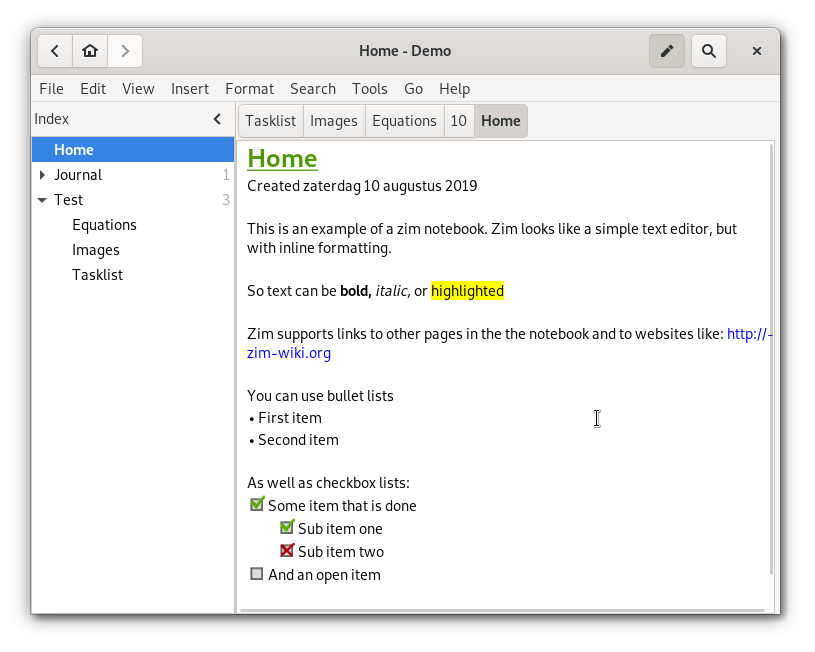

13- Notabase
Notabase is an open-source note-taking and Markdown editor designed for individuals who require a high level of note organization. It enables users to link notes together, facilitating the discovery of connections between ideas, similar to managing a personal Wikipedia.
Notabase is under active development, promising more features to enhance its functionality for personal knowledge bases, documentation writing, project management, and more.

14- TiddlyWiki
TiddlyWiki is a unique, flexible, non-linear notebook for capturing, organizing, and sharing complex information. It's a single HTML file that acts as a self-contained wiki.
Users can create documents and applications directly within TiddlyWiki, making it highly versatile for personal note-taking, task management, and project organization.
It's open-source and can be customized extensively with plugins, themes, and macros, enabling users to tailor it to their specific needs.
Ideal for researchers, students, and professionals, TiddlyWiki offers a powerful tool for knowledge management and information sharing.
15- Affine.Pro
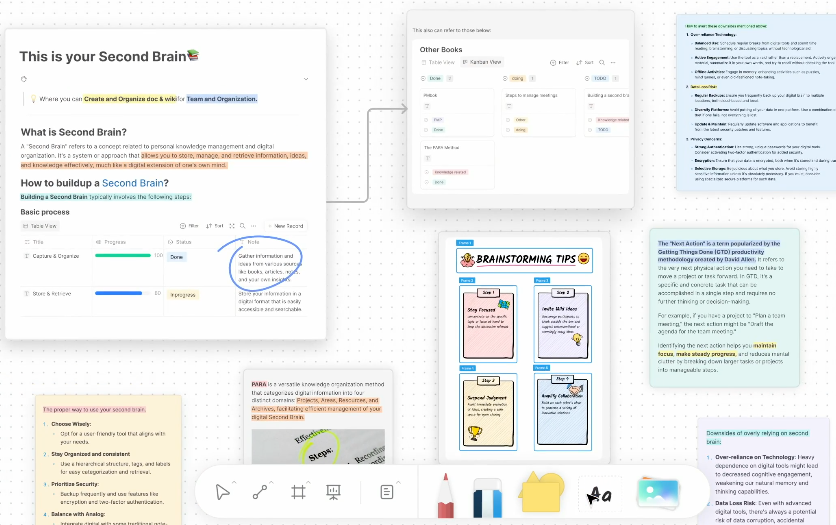
AFFiNE.PRO is an open-source, self-hosted alternative to Notion.AI, offering features like offline-first support, complete markdown support, modern block editor, privacy focus, and collaboration tools.
It's designed for creating, editing, and managing knowledge bases with a clean, intuitive design.


16- Zotero
Zotero is a free, open-source reference management software designed to collect, organize, cite, and share research. It allows users to easily save references from web browsers with a single click and organize them into collections for different projects.
Zotero supports a wide range of bibliographic data and document types, making it ideal for students, researchers, and academics. It integrates with word processors for seamless citation and bibliography creation, enhancing the research and writing process.
17- Outline
Outline is a modern, open-source wiki engine for teams and communities, focusing on collaboration and knowledge sharing. It features a clean interface, multi-user collaborative tools, full-text search, templates, collection management, and rich media embeds.
Outline supports multiple languages, including RTL languages, and integrates with services like Slack and Figma.
18- Knowfox
Knowfox is an open-source, web-based personal knowledge management system that's both self-hosted and locally operable. It supports organizing personal data, note-taking, journaling, and more. Key features include a Markdown editor for notes, photo management, full-text search capabilities, and the option to import Evernote notebooks.
Users can also manage bookmarks and easily share content. Designed for privacy and customization, it's ideal for those wanting to keep their data on a private server or their local machine.

19- Lifeograph
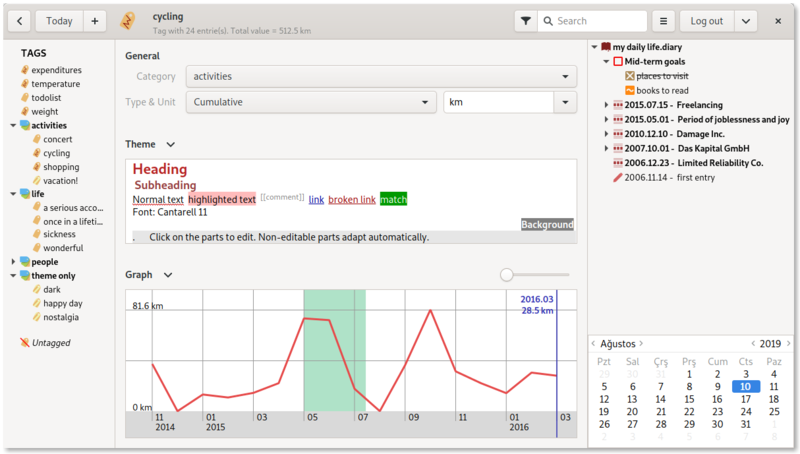
Lifeograph is an open-source personal diary and journal app designed for documenting thoughts, experiences, and memories. It features a simple interface, supports tagging, categorization, auto-save, and backup, and offers customization options including password protection.
Users can import and export entries, enjoy a calendar view, and set reminders. Its unique features include encrypted diaries, rich text formatting, advanced filtering, and synchronization across devices.
Lifeograph is available for Windows, Linux, and Android, with some features varying by platform.

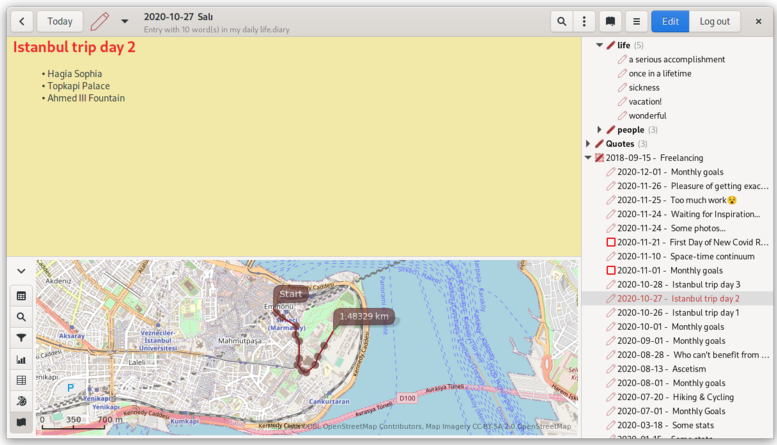
20- Archivy
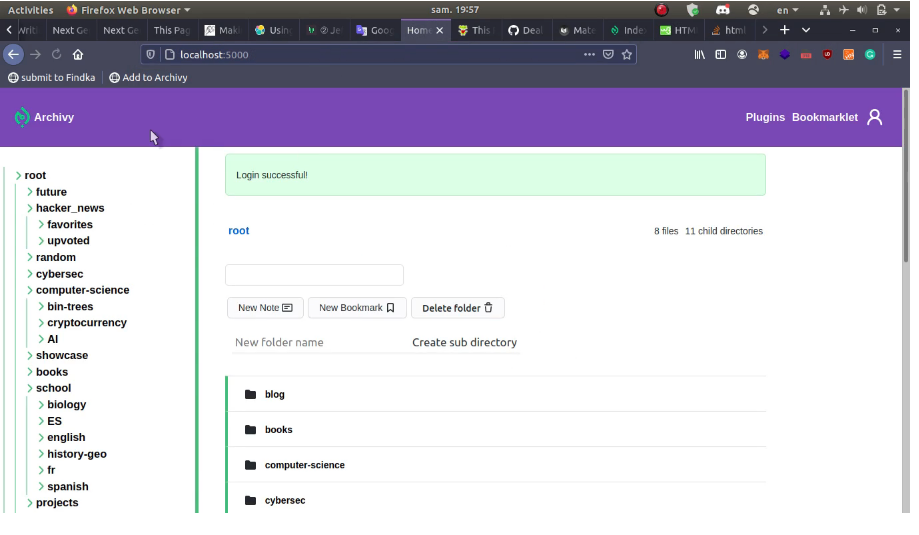
Archivy is an open-source knowledge base system designed for developers and researchers. It offers a personal and extensible wiki for bookmarking, archiving, and note-taking, with features like advanced full-text search, markdown support for notes, and YAML for metadata.
Its user-friendly interface allows for easy organization of notes and bookmarks, with additional capabilities like tagging, image uploads, and a tree hierarchy system.

21- Personal Management System (PMS)
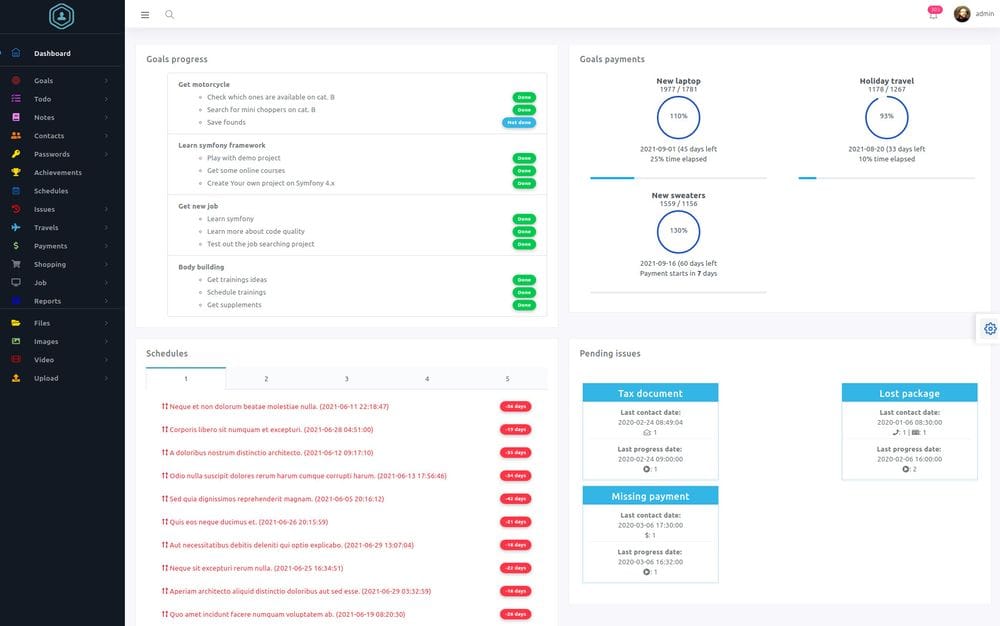
The Personal Management System (PMS) is an open-source, web-based organizer created by Dariusz Włodarczyk for managing daily activities, work, contacts, files, and more in one place.
It features a responsive dashboard compatible with modern browsers, and includes functionalities for task and goals management, note-taking, contact management, password management, schedules, achievements tracking, issues management, payments and billing, and managing images, documents, and videos.
Designed for personal use, PMS supports Docker installation and is recommended for Linux distributions but can also run on Windows.

22- Dendron
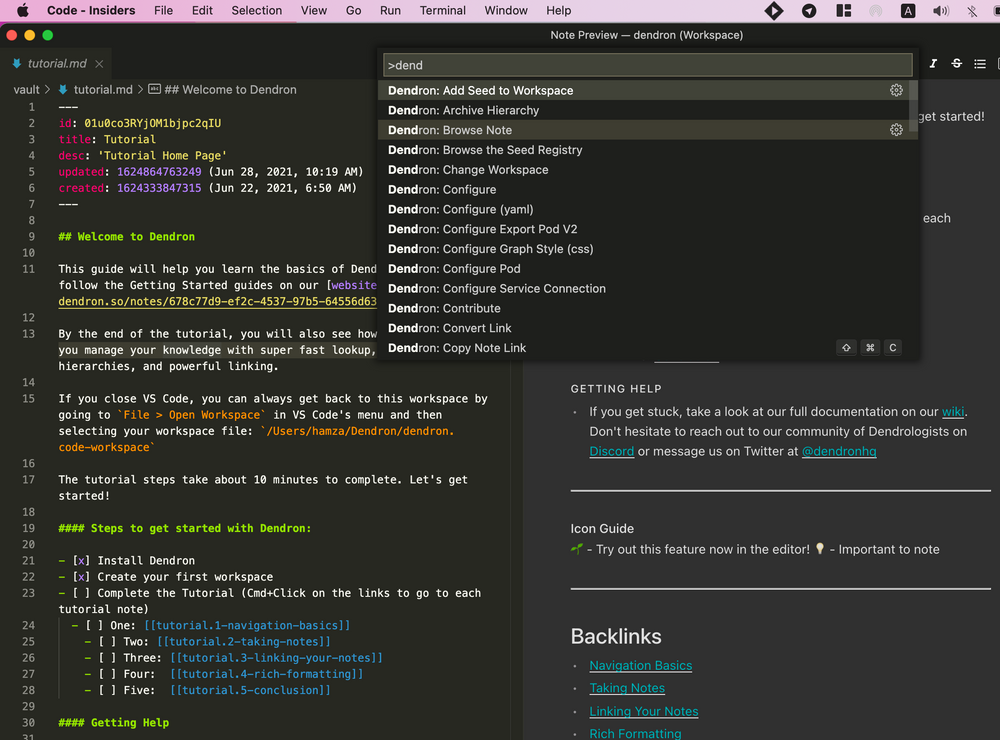
Dendron is a VS Code extension that transforms the code editor into a comprehensive knowledge management tool. It's geared towards personal knowledge management, documentation, and project management, offering features like note-taking in Markdown, easy-to-learn workflows, and extensive documentation.
Dendron supports linking notes, structured outlines, and utilizes Git for syncing. It stands out for its ability to manage large writing projects, connecting notes and ideas efficiently.

23- TreeSheet
TreeSheets is an innovative data organizer that combines aspects of spreadsheets, mind maps, and outliners into a compact, versatile tool. It allows for efficient organization and visualization of information, supporting a wide range of activities from project planning to note-taking.
Its user interface is designed to be intuitive, enabling users to create large amounts of data in a small space while maintaining readability and ease of navigation.
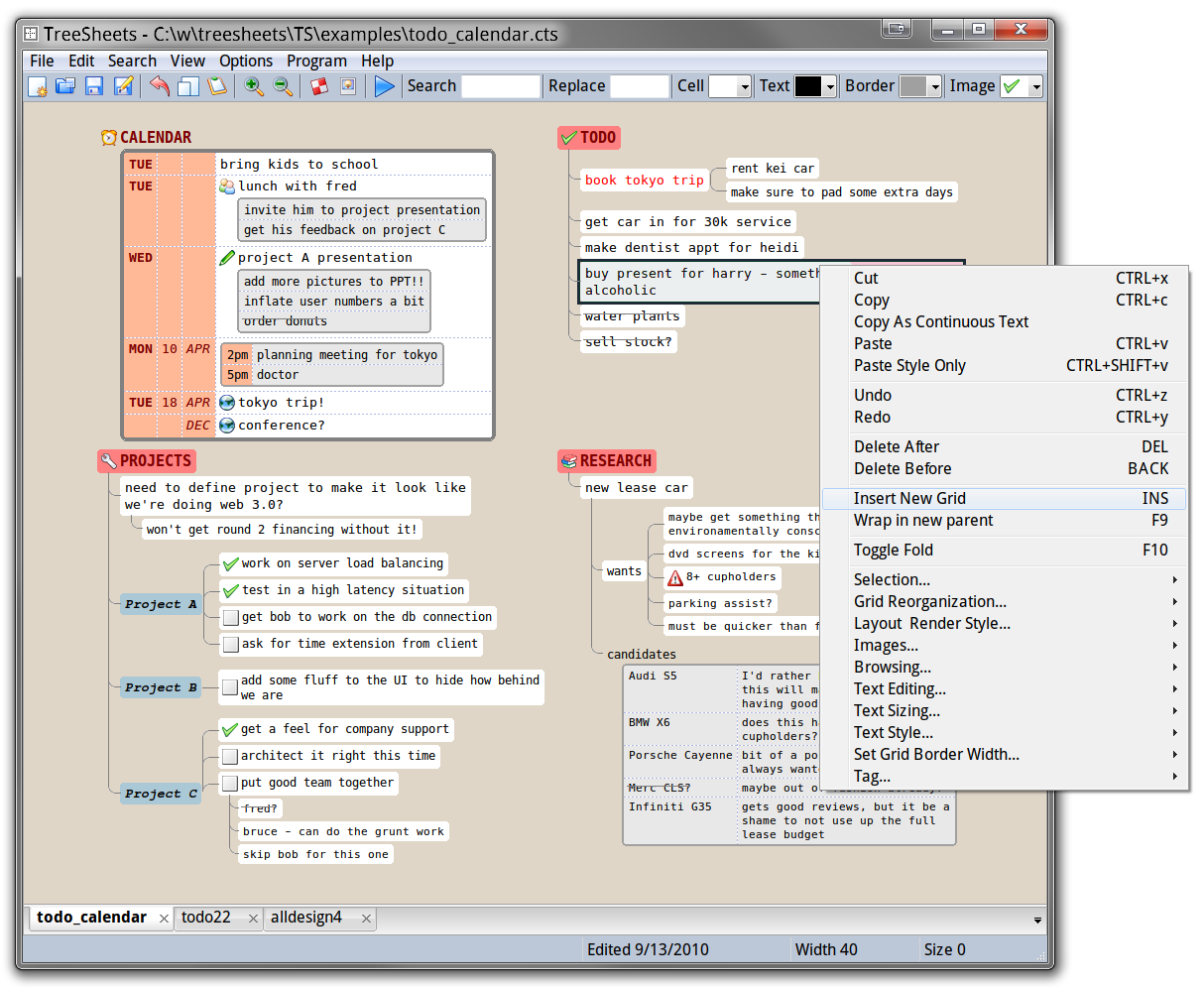
24- Trilium Notes
Trilium Notes is a hierarchical note-taking application designed for building personal knowledge bases. It features a rich text editor, support for scripting, and the ability to organize notes in a highly structured manner.
Trilium offers encryption for privacy, the ability to link notes, and attributes for advanced note categorization. It's available for multiple platforms, including Windows, Linux, and macOS.

25- Linked
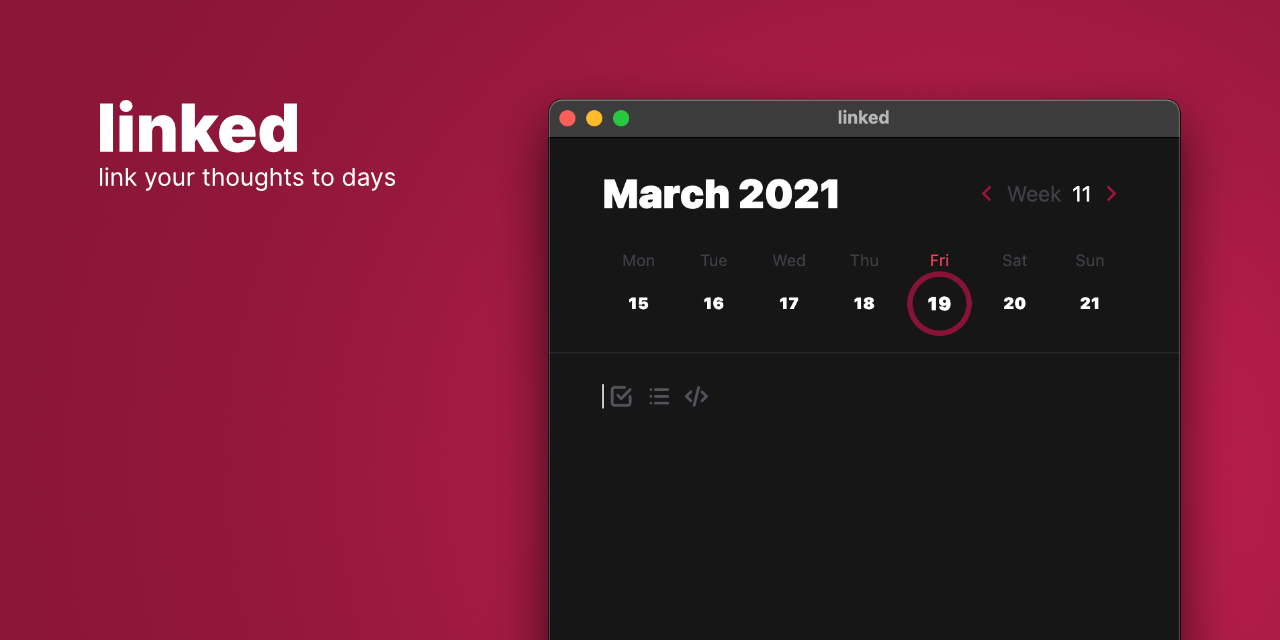
Linked is a distraction-free daily journaling app that offers an easy way for users to record their thoughts, declutter their mind, and preserve memories they want to keep. It emphasizes simplicity and focus, aiming to provide a serene environment for reflection and note-taking. The app supports community interaction via a Discord channel for users.
Features
- 📅 Write down anything and as much as you want per day
- 🔍 Search across all days
- ✍️ Support for various text styles as well as todo, list and code blocks
- 🖼 Linked comes in dark and light mode
- 💻 Keyboard navigation for maximum productivity
- 💾 Files are forever yours, you can find them at
~/Documents/linked - 🌐 Multi language support











